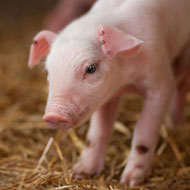
Scottish government launches new consultation
Views are being sought on whether to make porcine epidemic diarrhoea (PED) a notifiable disease in Scotland.
If the proposals go ahead there will be a legal requirement to report suspected cases of PED to the relevant authority. In this case, the authority will be Quality Meat Scotland (QMS), through the new Scottish Pig Disease Control Centre.
PED is caused by a virus that spreads rapidly and is easily transmitted through indirect contact. A new, highly pathogenic strain was discovered in China in 2012. It has a mortality rate of 80-100 per cent in piglets.
Announcing the consultation, Scotland's rural affairs secretary Richard Lochhead, said: "Scotland’s pig industry, which was worth £95 million to our economy last year, is understandably concerned about a new virulent strain of PED that has been seen in pig herds in China, North America and, more recently, in the Ukraine.
"Although there have been no reports of this strain in the EU, there are other strains circulating within the EU pig herd that could also have potentially serious consequences."
The Scottish government has launched a six-week consultation following requests from the pig industry. The move has been welcomed by numerous organisations including QMS, SAC Consulting Veterinary Services, BVA Scottish Branch and National Farmers' Union (NFU) Scotland.
It is hoped that making PED notifiable will help to prevent and control a potentially devastating disease.
"The threat posed to the health of Scottish pig herds by PED is substantial and infection would be a devastating blow to the sector," said Kevin Gilbert, who chairs NFU Scotland's pigs committee. "Were it to arrive, then speed is everything in disease control and in reducing the health, welfare and economic impact of a virus like PED."
All those with an interest in pigs and pig health are being urged to take part in the consultation. Brian Hosie, head of SAC, said: "The heavy mortality in piglets caused by this virus has had a serious impact on animal welfare and the viability of the pig industry in many countries.
"We welcome the proposal to make PED notifiable so that there is a legal requirement for anyone to report suspicion of the disease. This is an essential component of the contingency plan drawn up with Scottish producers."
To access the consultation visit: https://consult.scotland.gov.uk/animal-welfare/specified-diseases/



 The Animal and Plant Health Agency (APHA) has updated its online reporting service for dead wild birds.
The Animal and Plant Health Agency (APHA) has updated its online reporting service for dead wild birds.